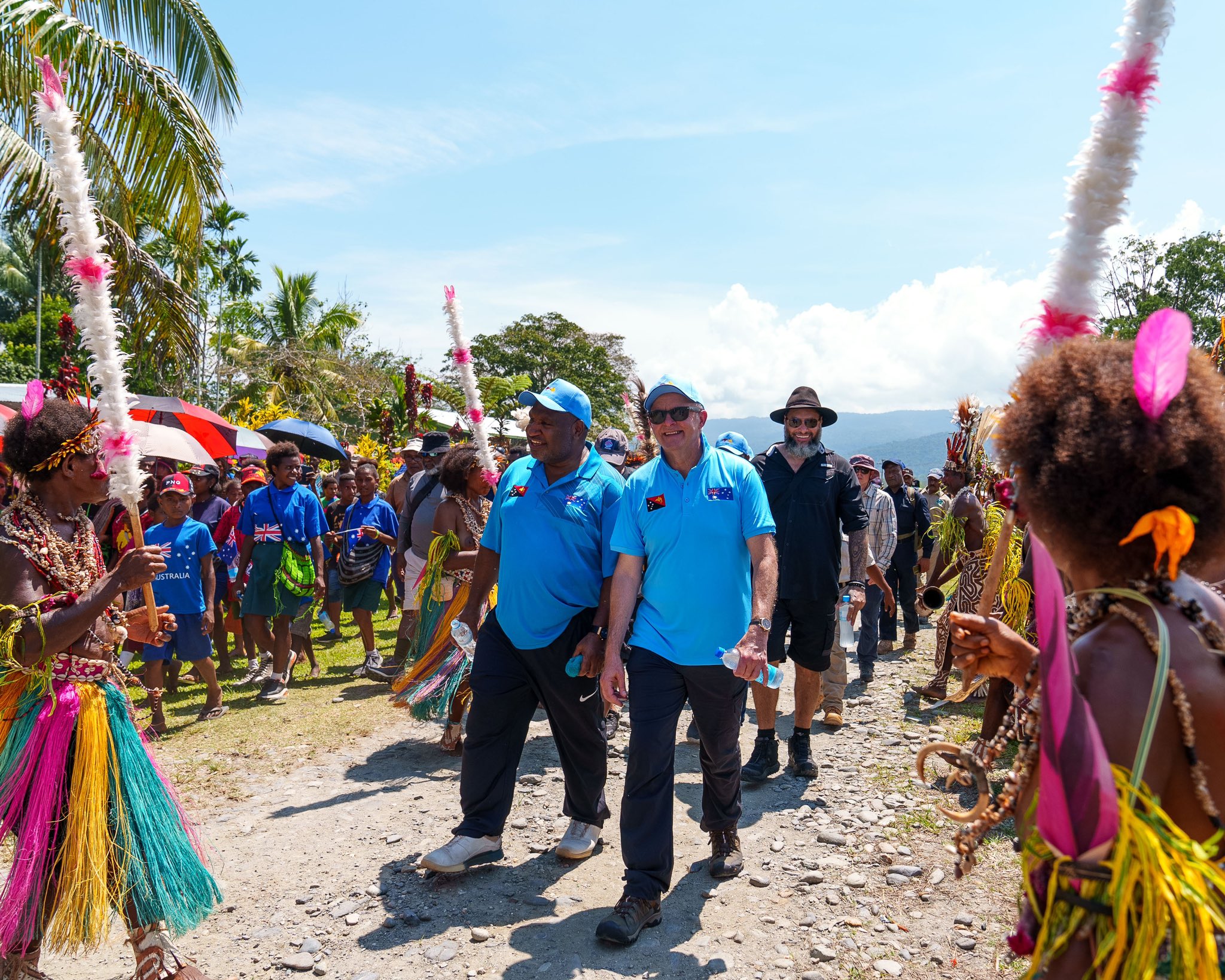Stronger ties between Papua New Guinea and Australia will help promote Pacific stability and freedom, Anthony Albanese says, invoking the legacy of World War II struggles in a rebuff to China’s expansionist push across the region.
Arriving in Port Moresby on Monday ahead of a week of Anzac Day commemorations, the prime minister said Australia would help build new defence barracks in PNG, assist with upgrades to six key ports and development of the country’s first two solar farms, while continuing cross-border labour agreements and humanitarian assistance.
Albanese says told dignitaries at the country’s parliament that Pacific nations must be “free to pursue their own destiny and secure their own future”.
Part of a major diplomatic effort with Australia’s northern neighbour, Albanese’s visit comes days after China’s Foreign Minister Wang Yi criticised jostling for regional influence, during which he said Pacific countries “are not the backyard” of any nation.
Albanese and his PNG counterpart, Prime Minister James Marape, will walk part of the Kokoda Track this week, retracing the harrowing journey of Australian forces seeking to hold back the advance of Japanese troops in 1942.
More than 620 Australians were killed in the campaign and 1600 were wounded. Their hard-fought success was critical to the security of the Australian mainland. Now part of Australian folklore, Kokoda attracts thousands of Australian tourists every year.
The leaders will spend two days walking the track before an Anzac Day dawn service at the Isurava memorial site on Thursday morning.
At a special commemoration dinner hosted by Marape on Monday night,Albanese said PNG and Australia were partners for a more prosperous, unified and secure region.
“Crucially, what gives us greater confidence in that better future is that we build on the strong foundations of our shared past,” he said.
“The legacy of those who fought for Papua New Guinea and Australia eight decades ago surrounds us, and warms us in its embrace.
“Our free societies. Our democracies. The very fact that we can gather here at peace and in friendship.”
China’s top diplomat signed a series of new agreements with the PNG government at the weekend, including deals to boost trade and informational technology capacity.
Chinese companies are already heavily invested in PNG’s resources sector, including gold mining and liquid natural gas production. High-level officials from Beijing are regular visitors to Port Moresby and other parts of the country.
China approached PNG in September with an offer to assist its police force with training, equipment and surveillance. Talks are ongoing, as PNG assesses if the Chinese offer will duplicate assistance already provided by Australia and the United States.
Wang used his visit to criticise Australia and the AUKUS partnership, saying the nuclear submarine deal with the U.S and UK had “instigated division” and was not in line with urgent needs of Pacific states.
“Pacific Island countries have a right to invite friendly co-operation with all development partners,” he said before departing.
“Both China and Pacific Island countries are members of the global south and are developing countries. It is honest and open of our two sides to help each other.
“Pacific Island countries are the home of the people in this region, they are not the backyard of any major country.”
Albanese used the first day of his visit to talk up defence training partnerships, and the bilateral security agreement signed in December. Australia will help break ground on new barracks in Port Moresby this year, as well as construction projects at Kokopo and Mt Hagen.
He said more than 2000 PNG nationals were working in Australia each year as part of the Pacific Australia Labour Mobility scheme, and growing ties would boost environmental and energy security.
Construction of Papua New Guinea’s first two solar farms, supported by Australia, is expected to help deliver solar power to about 12,000 homes, 22 community buildings and 750 streetlights.
Australia is also helping upgrade six key PNG ports, securing exports of products including coffee, cocoa and seafood.
Paul Keating sought to improve recognition of the Kokoda campaign while prime minister in the 1990s, helping fund memorials and other infrastructure, including hospitals, roads and a water reticulation system in Kokoda village.
Originally a network of trails to connect mountain villages, the track stretches for 96 kilometres from the Kokoda Plateau in the north to Owers’ Corner in the south.
Albanese became the first Australian prime minister to deliver a speech to the PNG parliament in early 2023, and Marape addressed federal MPs in Canberra in February.
During his visit last year, Albanese told PNG leaders the people of the neighbouring nations emerged as equals and mates from their fight against the Japanese.
PNG proclaimed independence from Australia in 1975, but Australia remains the country’s largest trading partner, with two-way trade of more than $4.8 billion (US$2. 58 billion)
PNG is also the largest recipient of Australian aid, worth $602 million (US$388 million) in 2022-2023, and making up more than 30 per cent of Australian aid to the Pacific region.
Foreign Minister Penny Wong is acting prime minister while Albanese is away and Defence Minister Richard Marles visits Gallipoli for Anzac Day.














